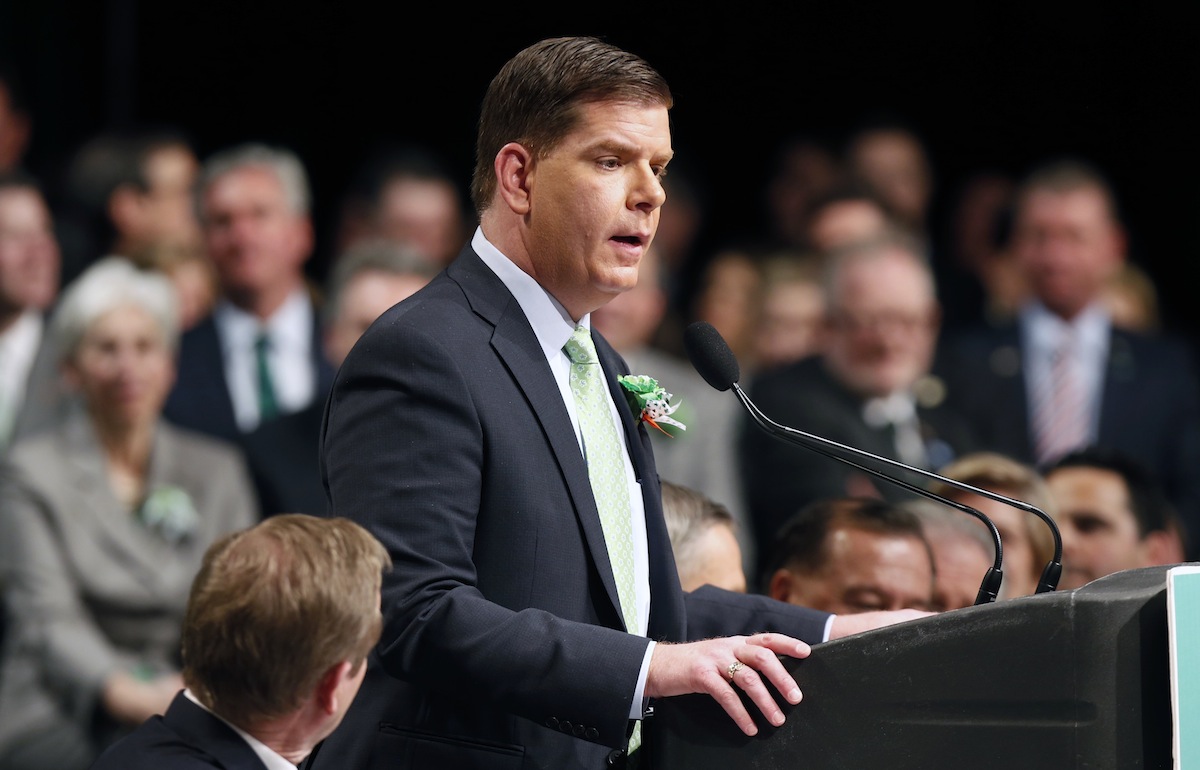Mayor Marty Walsh Is Making Good On His Promise to the Arts Community

Photo via Associated Press
During his campaign push, he promised to carve out an executive position focused specifically on the arts. Then, in his first-ever speech before the Boston Municipal Research Bureau, on March 7, he vowed to begin the search. And now, Mayor Marty Walsh is casting his net far and wide to find the city’s first cabinet-level Arts and Cultural Affairs Commissioner in the last two decades.
Just one week after telling a packed room of business leaders and constituents at the Boston Municipal Research Bureau breakfast about his goals as a newly elected official, Walsh’s administration posted a job listing online seeking candidates that would be interested in taking over as the Arts Commissioner, to expand on Boston’s outdoor cultural scene and develop a “comprehensive” arts plan for the community.
“We’re making culture a priority,” Walsh said at the breakfast.
Back in January, Walsh unveiled plans for his administration, shaking up cabinet positions and swapping around titles in order to build the team around him. When he made that announcement, there was an indication that the position for an Arts Commissioner was on the radar, and was marked by a designated spot—but he didn’t immediately fill the role.
After several months, the preliminary plan and requirements for the commissioner’s role have been crafted, and Walsh’s office is waiting for interested parties to start flooding the Human Resource department’s inbox with resumes. Boston reached out to city officials late Monday night via email to discuss the search process for the next position, but did not immediately receive a reply.
According to the job listing, which went up on March 14, the city is seeking a commissioner who can “serve as a network builder, connecting artists, arts and cultural organizations, local businesses, schools, and institutions of higher education with residents, ensuring that all residents are active participants in Boston’s rich cultural community.”
The lengthy job listing, posted to the Massachusetts Cultural Council’s website, also calls for applicants that can secure funding for new arts initiatives, develop relationships with surrounding municipalities to work collaboratively on new programs and events, and work with local artists to encourage “community-driven” branding in each neighborhood of the city. Walsh also wants the person to get into the schools to develop programming and partnerships.
The full-time job will potentially pay a qualified applicant between $110,000 and $127,000, and requires that they’re a Boston resident. “[They will] draw upon best practices of other municipal arts offices and foster a culture of transparency, inclusiveness, teamwork, innovation, and excellence,” officials wrote in the listing.
Jason Turgeon, producer of FIGMENT Boston and other art-based city events, said the listing is encouraging, and certainly holds true to campaign promises made by Walsh during the election cycle.
“[It’s] super encouraging, and he is doing it pretty quickly. I thought he’d hire a fire commissioner and school superintendent first. I thought we’d take a back seat in all of this, so I’m encouraged by this,” he said. “It’s certainly different than [former mayor Tom Menino’s] administration. It’s night and day, really. It seems like Walsh’s position will be much more connected to the arts community.”
Turgeon said while the person appointed to head the arts and tourism office during Menino’s reign was receptive to the voices of artists in the community, the role was split to focus on several key city developments, and the position didn’t come with real funding, relegating the arts to a “tourist and attraction thing” with little focus on Boston’s cultural aspects and offerings.
“It wasn’t an effective way to fund an arts program. There is a reason people lobbied for the elevation of this to be a cabinet-level spot,” said Turgeon.
He said the way in which Walsh’s job listing is outlined, “it hits the mark,” but the workload described in the post sounds heavy. “It’s a lot. So unless they are given the ability to hire competent staff, they can’t do everything in this job position alone,” he said. “It’s aggressive and trying to cover all bases, but if they don’t start with some dedicated funding—in the seven-figure range at least—whoever gets this job could be doomed for failure.”
Regardless of the intended workload for the yet-to-be-named arts commissioner, Turgeon feels confident that Walsh’s speedy response to searching for the right person to head the arts initiatives in Boston is a steady first step in the right direction. “He’s definitely delivering on his promise,” he said.


